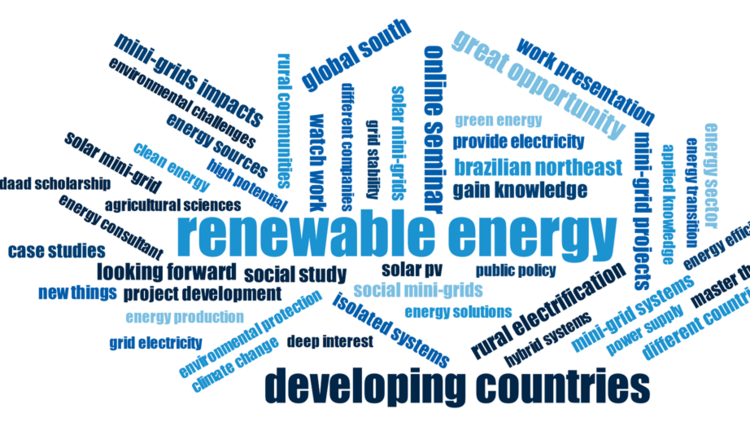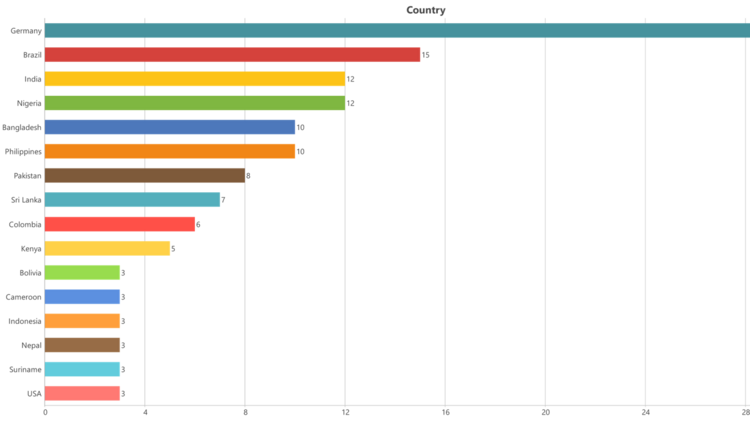International Online Seminar: Mini-Grids in the Global South: Planning, Implementation and Future Perspectives
University of Oldenburg, 20th November – 6th December 2020
The team from the Postgraduate Programme Renewable Energy (PPRE) from the University of Oldenburg together with some of the students organized an online seminar financed by the German Academic Exchange Service (DAAD). This seminar involved a myriad of activities from having guest speakers giving presentations to having panel discussions. Due to current COVID-19 pandemic, the seminar could only be held online. The main focus of the seminar was to provide the participants with theoretical and applied knowledge about the implementation of mini-grids in developing countries. There has been a lot of discussion about the future of mini-grids especially so in developing countries where a large part of the population has no access to electricity. Therefore, this seminar was a great opportunity to learn more about mini-grids. The seminar did not only take into account the technical aspects but also the socio-ecological, economic and political aspects that also play a major role in implementation of a mini-grid. The seminar was mostly offered to students and alumni of various DAAD supported development-related postgraduate programmes. Furthermore, PPRE and EMRE (European Master in Renewable Energy) students were welcome to join the seminar. There were about 145 registered participants in total. Based on the motivation which had been earlier sent by the participants it was quite clear that they were eager to learn about mini-grids and their potential in the developing countries, as it is shown by the word cloud created based on their motivation statements (Fig. 1).
The key speakers had vast knowledge and years of experience in implementation of mini-grids in developing countries. They had mostly worked in India, Brazil, Bangladesh, Nepal, Indonesia and African countries such as Guinea, Namibia, Tanzania among others. Most of the participants were also from these countries, thereby making the seminar more meaningful (see Fig. 2).
The presentations were held on Friday afternoons from 14:00 - 18:00 Central European Time (CET) and on Saturdays from 09:00 – 12:30 CET. Based on the statistics it was quite clear that Saturdays were not such a favorable day since the number of participants in the seminar was lower as compared to Fridays. There were two to three sessions per day. Each session lasted from about 1hr 15 minutes to 2hrs. Each session had about three guest speakers. There was a chair for each session to ensure that everything was carried out smoothly and according to the plan. Some of the sessions were chaired by students from the PPRE program which was a good initiative by the faculty as it gave the students a chance to be more involved in the seminar and take up some leadership roles.
The technical aspects of mini-grids such as the definition of a mini-grid, typical configurations of a solar-PV mini-grid, factors to be considered when selecting a system configuration among other topics were covered extensively. The socio-ecological aspects of mini-grids including the challenges that faces the implementation of mini-grids such as taking care of the hydrography of an area, the fauna and flora among other things were also discussed. One of the social benefits brought about by implementation of a mini-grid is that the community is able to obtain additional revenue through activities that use electricity. The economic aspects were also covered questions such as the capital, construction cost, operation and maintenance costs as well as other expenses involved in setting up and operating a mini-grid were covered as well as some of the sources of financing. The political aspects and the importance of good governance and policies when it comes to implementation of mini-grids was discussed extensively throughout the seminar. This was deemed as a key factor to spearhead implementation of more mini-grids in developing countries.
Open space workshops are used as an avenue for providing an opportunity for a group of people to come together and create topics of discussion about almost any theme without having to make intense preparations. The open space workshop which was also online was one of the key highlights of the seminar. There were five themes for discussion and the participants had the choice on which of the five seminar topics they would attend with even the option of attending all the topics.
The topics to be discussed were: mini grid business models by Ram Prasad Dhital, automating off-grid system optimisation / challenges in the optimization of hybrid PV-diesel operation by Roy Emmerich, design criteria for mini grid setup (India case study) by Dwipen Boruah, opportunity framing in mini-grids for sector coupling by Mominul Hasan and how to go along with increasing demand after implementation off grid supply by Hans Holtorf. Each of the five topics was allocated about sixty minutes for discussion. This session gave the participants an opportunity to have in depth discussions in their preferred topics and to have any pending questions that they had to the speakers answered. The key points from these five themes were jotted down and discussed later to all the participants. Based on the feedback received, the participants really enjoyed this session and requested that more time be allocated for the open space workshop in the next seminar.
The seminar also included a special event which involved interviewing some of the participants, speakers and organizers of the “OEC Off-grid Expo Conference”. The “OEC Off-grid Expo Conference” is normally held every year in Augsburg but in 2020, due to the current Corona virus pandemic, the conference was held online.
The interviewees from Phaesun talked about what their company does and their motivation behind implementation of mini-grids in the African continent. They gave the participants a better view of the challenges they have faced and how they were able to tackle them. One of the interviewees, Ms. Sonja Mettenleiter, received an award for 1st place in the education mile contest for a solar cooling project she implemented in Tanzania.
The final day of the seminar was crowned by a panel discussion with the guest speakers where different topics were discussed in detail. Some of the concluding statements were that there was need to have a clear roadmap of the possible areas where a mini-grid could be set up and also an area where the local grid currently has no plans of providing electricity. Policies should also be set up in such a way that the mini-grid and the grid can have mutual agreements, e.g. via bi-directional flow of electricity. Discussions about African countries showed also their need to have better policies about the integration of mini-grids.
Overall, the workshop proved to be very successful with only a few minor challenges as is expected of an online conference and also considering that this was the first DAAD online seminar conducted by the PPRE team. The participants expectations were met and they were more than impressed with the content and discussion. They also went ahead to suggest some of the topics that could be discussed in the next seminar and looked forward to the next seminar.





